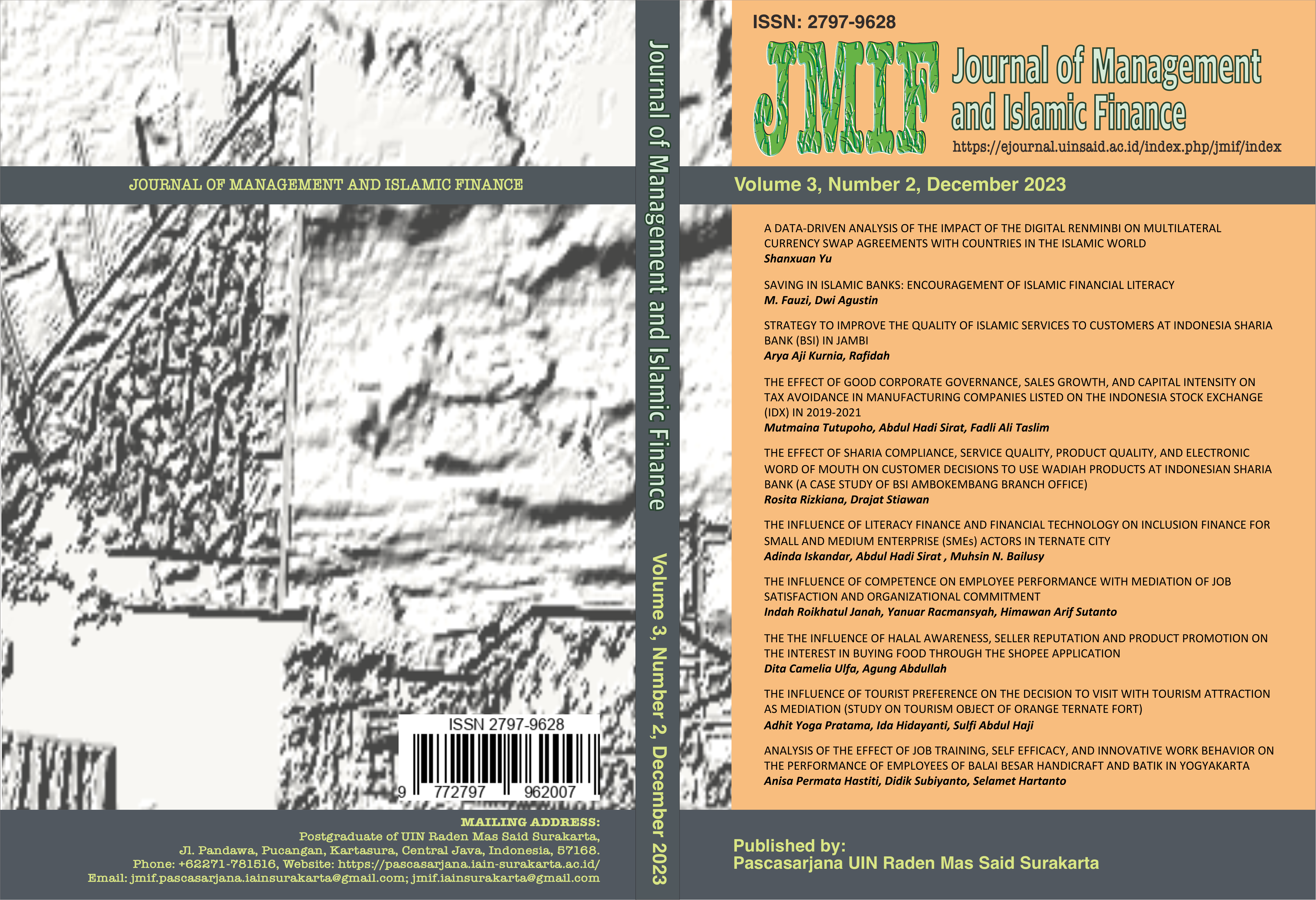STRATEGY TO IMPROVE THE QUALITY OF ISLAMIC SERVICES TO CUSTOMERS AT INDONESIA SHARIA BANK (BSI) IN JAMBI
DOI:
https://doi.org/10.22515/jmif.v3i2.6267Keywords:
Strategy, Services, Improving Service QualityAbstract
This study aims to find out how the strategy is to improve the quality of Islamic services contained in Indonesia Sharia Bank for its customers during the Covid-19 period in Jambi. The research method was field research using qualitative in nature, data collection used three techniques, namely observation, interviews, and documentation and was carried out on December 13, 2021 at Indonesia Sharia Bank, Jambi. The results of the research strategy to improve the quality of Islamic services to customers of Indonesia Sharia Bank in Jambi and in accordance with the concept of Ultimate Service as Business Acceleration have been running optimally in accordance with the 6 dimensions of service quality described by Othman and Owen known as the CARTER method, (Compliance, Assurance, Responsiveness, Tangible, Empathy and Reliability). Principles of Islamic law do not cheat and always provide financial solutions.
Downloads
References
Ahmad Algi Saputra, Ida Bagus Nyoman Udayana, & Nonik Kusuma Ningrum. (2022). Pengaruh Service Quality Dan Perceived Security Terhadap Loyality Konsumen Dengan Trust Sebagai Variabel Intervening Pada Perusahaan E-Commerce Bukalapak (Studi Kasus Pada Pengguna E-Commerce Bukalapak). MANDAR: Management Development and Applied Research Journal, 5(1), 87–101. https://doi.org/10.31605/mandar.v5i1.1849
Ahmad Zikri, M. I. H. (2022). Analisis Kualitas Pelayanan Pengiriman Barang terhadap Kepuasan Konsumen pada PT Pos Indonesia Regional I Sumatera. Jurnal Ilmu Komputer, Ekonomi Dan Manajemen (JIKEM), 1(1), 129–138.
Choliq, H. A., & Misbach, I. (2016). Perbandingan Kualitas Layanan Bank Syariah Dan Bank Konvensional (Pendekatan Model PBZ). Jurnal Keuangan Dan Perbankan, 20(1), 127–140. https://doi.org/10.26905/jkdp.v20i1.157
Firdaus, I. T., Tursina, M. D., & Roziqin, A. (2021). Transformasi Birokrasi Digital Di Masa Pandemi Covid-19 Untuk Mewujudkan Digitalisasi Pemeritahan Indonesia dalam studi “ The Microsoft Asia Digital Transformation : Enabling The Intelligent Presiden Joko Widodo pada Rapat Terbatas mengenai Perencanaan Tr. Kybernan: Jurnal Stdui Kepemerintahan, 4(2), 226–239.
Gunardi, H. (2022). Laporan Tahunan Kinerja Bank Syariah Indonesia (BSI) Tahun 2022.
Isabella, I., Sani, A., & Alam, A. P. (2022). Pengaruh Kualitas Pelayanan Islami Terhadap Kepuasan Nasabah Dalam Konsep Ekonomi Islam Pada PT. Bank Syariah Indonesia, Tbk Kcp Stabat. Jurnal El Rayyan, 1(2), 1–8.
Putra, R. P., & Herianingrum, S. (2015). Pengaruh Kualitas Pelayanan Islami Terhadap Kepuasan dan Loyalitas Nasabah Bank BRI Syariah Surabaya. Jurnal Ekonomi Syariah Teori Dan Terapan, 1(9), 622. https://doi.org/10.20473/vol1iss20149pp622-635
Rafidah. (2014). Kualitas Pelayanan Islami Pada Perbankan. Nalar Fiqh, 10(2), 113–126.
Sayekti, F., Purnama, Y. I., & Wijayanti, L. E. (2021). Pengaruh Kualitas Pelayanan terhadap kepuasan Pemakai Layanan Jasa pada Instansi Pemerintah. The 2nd Widyagama National Conference on Economics and Business (WNCEB 2021), Wnceb, 162–173.
Syahrial, M. (2018). Kualitas Pelayanan Dalam Islam. Jurnal IndraTech, 8(4), 81–94.
Trimulato, Supriadi, Asyraf Mustamin, St. Hafsah Umar, dan S. N. (2021). Asyraf Mustamin 3) , St. Hafsah Umar 4) , dan Surya Ningsih 5) 12345 Dubai Syariah Branch Makassar, and the Covid-19 Pandemi Saran sitasi. Jurnal Ilmiah Ekonomi Islam, 7(03), 1293–1305. http://jurnal.stie-aas.ac.id/index.php/jiedoi:http://dx.doi.org/10.29040/jiei.v7i3.2908DOI:http://dx.doi.org/10.29040/jiei.v7i3.2908
Zamroni, M., & I Gusti Ayu Ketut Rachmi Handayani. (2005). Pentingnya Kualitas Pelayanan (Service Quality) dalam Memenuhi Kepuasan Masyarakat (Society Satisfaction). Effisiensi Kajian Ilmu Administrasi, 5(2).
Downloads
Published
Issue
Section
Citation Check
License
Copyright (c) 2023 Arya Aji Kurnia, Rafidah

This work is licensed under a Creative Commons Attribution-ShareAlike 4.0 International License.
Authors who publish with this journal agree to the following terms:
- Authors retain copyright and grant the journal right of first publication with the work simultaneously licensed under a Creative Commons Attribution License that allows others to share the work with an acknowledgement of the work's authorship and initial publication in this journal.
- Authors are able to enter into separate, additional contractual arrangements for the non-exclusive distribution of the journal's published version of the work (e.g., post it to an institutional repository or publish it in a book), with an acknowledgement of its initial publication in this journal.
- Authors are permitted and encouraged to post their work online (e.g., in institutional repositories or on their website) prior to and during the submission process, as it can lead to productive exchanges, as well as earlier and greater citation of published work.






